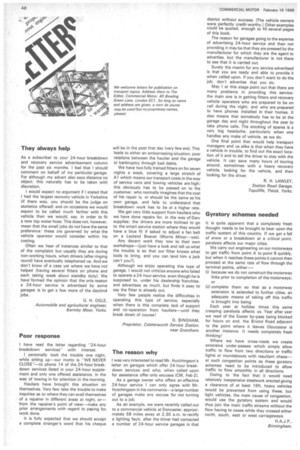Gyratory schemes needed
Page 50

If you've noticed an error in this article please click here to report it so we can fix it.
It is quite apparent that a completely fresh thought needs to be brought to bear upon the traffic system of this country. If we get a fall of snow or a breakdown at a critical point. paralysis affects our major cities.
We carry out engineering on our motorways to get traffic from point A to point B quickly, but when it reaches these points it cannot then proceed at the same rate of flow through the terminal points, either:— (i) because we do not construct the motorway links prior to completion of the motorways: Or (ii) complete them so that as a motorway extension is extended to further cities, an adequate means of taking off this traffic is brought into being.
Each year at holiday times this same creeping paralysis affects us. Year after year we read of the Exeter by-pass being blocked for hours on end, the Bristol Road adjacent to the point where it leaves Gloucester is another instance. It needs completely fresh thinking!
Where we have cross-roads we create extensive under-passes which simply allow traffic to flow from two directions or traffic lights or roundabouts with resultant chaos— at such congestion points as these gyratory schemes need to be introduced to allow traffic to flow smoothly in all directions.
Owing to the fact that it would need relatively inexpensive steelwork erected giving a clearance of at least 16ft, heavy vehicles would be prevented from using these, but light vehicles, the main cause of congestion, would use the gyratory system and would thus join the main traffic streams without the flow having to cease while they crossed either north, south, east or west carriageways.
H.A.J. P. , Birmingham.




















































































































